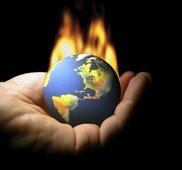 | « Back to article | Print this article |
 With the price of carbon credits continuing to slide in the global markets and the first commitment period for the Clean Development Mechanism (CDM, under which carbon trading is permitted) coming to an end this year, companies and investors holding carbon credits are worried at the prospect for investments in this regard.
With the price of carbon credits continuing to slide in the global markets and the first commitment period for the Clean Development Mechanism (CDM, under which carbon trading is permitted) coming to an end this year, companies and investors holding carbon credits are worried at the prospect for investments in this regard.
"Investors are worried.
"No transaction is happening in the global carbon market.
"The prices have come to below a dollar and no one (holding a carbon credit) is willing to exit the market.
"The negative sentiments can affect new green project registrations as well. When the carbon prices are too low, then companies and investors would not like to venture there," said a partner with a leading consultancy firm.
One carbon credit point is issued against every tonne of carbon dioxide emission the project avoids.
For earning the credits, companies have to register their projects with the United Nations Framework Convention on Climate Change.
Carbon offset credits have fallen to a new all-time low amid oversupply and signs of a possible ban on some credits in the European Union system.
The price of one carbon credit, nearly Euro 24 (Rs 1,500) in 2008, was Euro 0.83 on Thursday.
According to Seema Arora, executive director, CII-ITC Centre of Excellence for Sustainability Development, "Many Indian companies had sold their carbon credits before the Durban talks (UN Climate Change Conference, December 2011).
After Durban, Europe, one of the major buyers, put a brake on purchase of green credits, citing recession and a financial crisis.
"Indian firms are holding on to the remaining credit points with the hope that the market would rebound."
After the talks at Durban, Indian industry hoped it would gain from an extension of the Kyoto Protocol (to the UNFCC, setting binding obligations on industrialised countries to reduce their emissions of greenhouse gases by 2012).
But the carbon market continued to remain in the red after December 2011.
Major